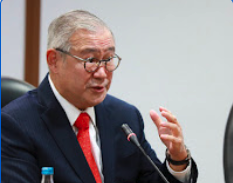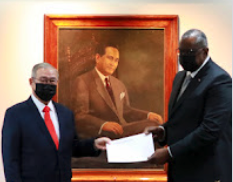Change in foreign policy towards US no surprise says UP Professor Simbulan
- Melo Acuna
- Jul 31, 2021
- 6 min read
Special Report
Strengthening PH-US security ties through VFA; no surprise to Professor Roland Simbulan
MANILA – President Rodrigo Duterte has recalled yesterday the abrogation of the Visiting Forces Agreement which he declared last June 14,2021.
In a statement released late Thursday night, the Office of the President said President Duterte and visiting U.S. Defense Secretary Lloyd C. Austin III the existing alliance “can be further strengthened through enhanced communication and greater cooperation” in areas of pandemic response, fight against transnational crimes, including the war on illegal drugs, maritime domain awareness, the rule of law, and trade and investments.
Speaking to mainstream reporters mid-morning of Friday, U.S. Defense Secretary Lloyd C. Austin III expressed his appreciation for the restoration of the Visiting Forces Agreement during his press briefing with Defense Secretary Delfin N. Lorenzana at Camp Emilio Aguinaldo.
He said with the VFA, there will be over 300 bilateral engagements between the United States of America and the Philippines.
“Thanks to the VFA, the Department of Defense can conduct more than300 bilateral engagements a year with the Armed Forces of the Philippines, from expert exchanges, to component exercises and major training exercises such as Balikatan,” Defense Secretary Austin said.
In his remarks during the joint press briefing with Defense Secretary Lorenzana, he said the alliance built on common interest and values “and the ties that bind have been reinforced by a shared history.”
Secretary Austin said his probably served in the Philippines during World War II as a corporal of the United States Army. He added his father was one of the American and Filipino services who fought together “to defeat aggression and secure freedom in the Pacific.”
Over in Malacañang, Presidential Spokesperson Harry Roque said President Duterte’s decision to recall the abrogation of the Visiting Forces Agreement was founded on upholding the country’s strategic core interests, “the clear definition of the PH-US alliance as one between sovereign equals, and clarity of US position on its obligations and commitments under the 70-year old Mutual Defense Treaty.”
“(The) Philippines will, however, continue to engage other countries for partnerships that work, based on our core national interests,” Secretary Roque added.
Defense Secretary Lorenzana said his Department “fully supports the decision of President Rodrigo Duterte to recall the letter of termination of the Visiting Forces Agreement.”
He said in a statement, though the Philippines-U.S. alliance stands on solid ground with the 1951 Mutual Defense Treaty in place, “the restoration of the VFA allows us to further promote military cooperation between our two nations.”
He expressed optimism the bilateral relations with the US will add up to the enhancement of the country’s capabilities of the Armed Forces and in pursuit of its national interests.
“Our long-standing partnership is founded on solidarity and the preservation of international peace,” Secretary Lorenzana further said.
At the Department of Foreign Affairs, Secretary Teodoro L. Locsin, Jr. said the alliance has stayed strong and withstood challenges.
“It is vital to maintaining stability in the Asia-Pacific region. All the protagonists in the region, without a single exception, see a strong US presence as imperative to peace and stability in Southeast Asia,” he said. He added American presence is a precondition for mutually beneficial cooperation rather than destructive conflict among themselves.
He credited the United States for showing its commitment to fulfill its obligations under the existing alliance as they addressed issues from security relationship with good faith.
“As such, upon the instructions of President Rodrigo Roa Duterte, today I handed over to United States Secretary of Defense Lloyd J. Austin III the Diplomatic Note recalling the abrogation of the Visiting Forces Agreement,” he concluded.
However, Prof. Roland Simbulan said he will not be surprised at all should President Duterte’s decide to push through with the Visiting Forces Agreement signed in 1998.
Interviewed early Wednesday night over this writer’s COFFEE CHAT, the University of the Philippines Academic Roland Simbulan said behind all the rhetoric of President Duterte of his so-called pivot to China, the relations between the United States of America and the Philippines has remained intact.
“I said that basically perceived because our relations with the United States, security wise, economically, and even politically, remain intact,” Professor Simbulan said. He added the Philippines did not benefit in terms of investments and loans from China.
He explained had the Philippines benefited from the publicized pivot to the world’s second biggest economy, President Duterte could have mentioned it in his fifth and last State of the Nation Address last July 26.
Professor Simbulan said it was in Beijing in October 2016 when President Duterte declared the Philippines’ independence from the United States and basically severing ties with the United States.
“I have not seen any official policy documents of the Department of Foreign Affairs and the Department of National Defense because through these Departments, we are dealing with the United States,” he added.
He underscored the need for policy direction that will guide the officials of the concerned departments.
He described the relationship with the United States of America for the past five years is “business as usual.” He explained the joint military exercises increased during President Duterte’s early years in office.
Professor Simbulan said President Duterte’s anti-American statements were for his Chinese hosts, when he began to make strong statements against outgoing US President Barack Obama.
He explained this was President Duterte’s reaction to then US President Obama’s special statement criticizing the extrajudicial killings.
“I think President Duterte reacted to this critique, his human rights record as city mayor, in very clear terms and in very dramatic terms specially in Beijing before a Chinese audience,” he added.
During the same interview, Professor Simbulan noted during President Duterte’s visits to military camps across the country there was no mention of the Philippines’ pivot to China because most senior military officials are more sympathetic to the United States.
The advantage the United States has over China is the fact they’re already in the Philippines.
“We have long been under the umbrella, security umbrella of the United States and the United States has several existing security agreements with the Philippines which are being implemented today,” he clarified.
Aside from the Mutual Defense Treaty of 1951, the Visiting Forces Agreement of 1998, there’s also the Mutual Logistics Support Agreement which allows the United States to deploy logistical equipment in the Philippines.
The Enhanced Defense Cooperation Agreement of 2014 allows the US to construct or install military equipment in Philippine military camps in any part of the country which will be allowed should the US request for it.
“Many of our ports have seen port visits by the US Armed Forces, submarines and personnel as well as our airfields could be visited under the existing agreements,” he added. Such arrangements would make them cost effect effective rather than maintain military bases or facilities during the Cold War era.
He added the United States has considered the Philippines as its “aircraft carrier” in the Western Pacific. He credited the US military for its indoctrination of Filipino military officials during their training and schooling in the United States. The US has its influential American Chamber of Commerce in the Philippines.
“Culturally and historically, the long ties resulted in the closeness of Filipinos to the United States. There is a significant number of Filipinos serving the United States armed forces in its over 800 bases and installations worldwide.
He noted the Philippine government relied solely on the United States for its external defense which was the same reason why modernization failed to materialize. The Philippines’ reliance on the US continued with the VFA.
“This is the reason we lag behind our ASEAN neighbors,” he added.
Asked how the Philippines could benefit from its relations with the both the United States and the People’s Republic of China, Professor Simbulan said the country’s leaders should be able to see the importance of the country’s location to the competing superpowers.
“Big powers would be interested in having a friend, an ally in this region. They would like their own ‘Manchurian candidate’ they would support. There will be troll armies and technology to penetrate systems, acquire the information they need and may also spread disinformation through the social media which are new instruments in elections,” he explained.
He said the country’s leaders should be able to get the needed benefits from both the United States of America and the People’s Republic of China to improve the AFP’s capability. (Melo M. Acuña)
U.S. Secretary of Defense Lloyd C. Austin III meeting exchanging pleasantries with Defense Secretary Delfin N. Lorenzana (left Photo), Foreign Secretary Teodoro L. Locsin, Jr. delivering his remarks during his meeting with Secretary Austin (second from left photo), Secretary Austin receives the handing over the document that withdraw the diplomatic note recalling the termination of abrogation of the VFA treaty. (second from right photo) and UP Professor Roland Simbulan during the COFFEE CHAT interview Wednesday evening. (Shared photos with the Departments of National Defense and Foreign Affairs/Professor Roland Simbulan (right most photo) during the interview over COFFEE CHAT Wednesday/Melo M. Acuna)








Comments